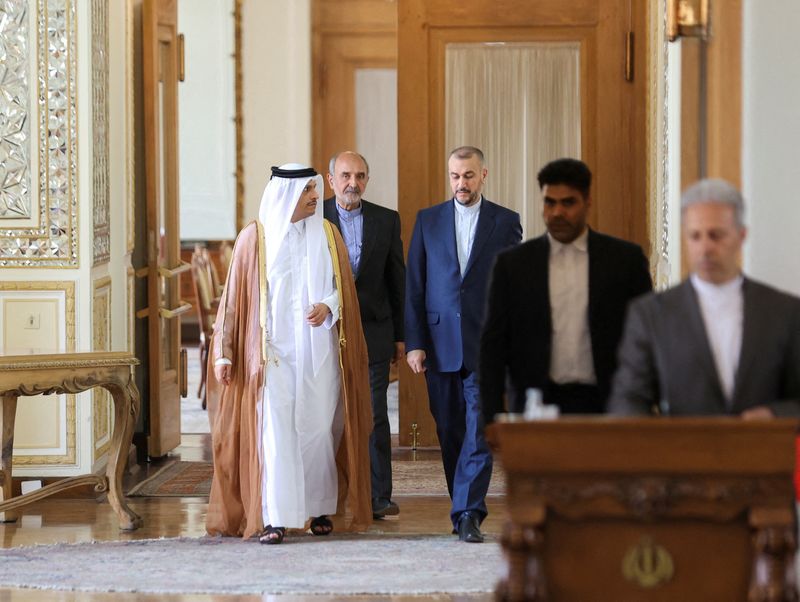By Parisa Hafezi, Jonathan Landay and Arshad Mohammed
UNITED NATIONS/WASHINGTON (Reuters) -Qatar held separate bilateral meetings with the United States and Iran this week that touched on Iran's nuclear program and U.S. concerns about Iranian drone transfers to Russia, two sources familiar with the matter said on Wednesday.
The sources said the meetings have not involved the kind of shuttle diplomacy Qatar conducted in Doha this year in which Qatari diplomats went back and forth between the two sides, ultimately leading to Monday's U.S.-Iran prisoner exchange.
Qatar, a wealthy Gulf Arab state with diplomatic ambitions, is pressing both sides to engage in more talks and reach "understandings," sources told Reuters earlier.
One source, who like the others cited spoke on condition of anonymity because of the sensitivity of the matter, said meetings took place on Monday and Tuesday in New York on the sidelines of the annual U.N. General Assembly.
The second source, a diplomat in the Middle East briefed on the matter, said there would be additional bilateral talks this week, but did not provide details.
The diplomat described the New York meetings as "talks for talks," saying the idea was to lay the ground for future indirect discussions to achieve an "understanding" on the nuclear issue.
Iranian, Qatari and U.S. spokespeople did not immediately respond to requests for comment.
Relations between the United States and Iran, long-time antagonists, have been especially bitter since 2018 when then-President Donald Trump pulled out of a 2015 deal aimed at curbing Tehran's nuclear ambitions and toughened U.S. sanctions.
Washington suspects Iran's nuclear program may be aimed at developing nuclear arms, a charge Iran denies.
The United States also says Iran has provided one-way attack drones for Russia to strike Ukraine and wants Tehran to stop. Iran says it has not provided Russia drones for use in Ukraine.
The Biden administration's efforts to revive the Iran nuclear deal have failed and many diplomats now regard it as beyond resurrection because of Iran's nuclear advances.
U.S. officials have responded carefully when asked whether there would be indirect U.S.-Iran talks this week and have not outright denied the possibility even as they have suggested Washington is not currently engaged in such diplomacy.
"When it comes to perhaps the number one issue of concern, which is Iran's nuclear program, we continue to believe that diplomacy is the best way to get a sustainable, effective result," Secretary of State Antony Blinken said on Monday.
"We'll continue to see if there are opportunities for that. In this moment, we're not engaged on that, but we'll see in the future if there are opportunities," he added.

A European diplomat said he did not know whether Qatar had broached the nuclear and drone issues in bilateral meetings, but he voiced doubt it would have done so on Iran's atomic program.
"Nothing's impossible, but I'm skeptical, particularly on the nuclear issue where the mediation has generally been handled more by Oman," this diplomat said.